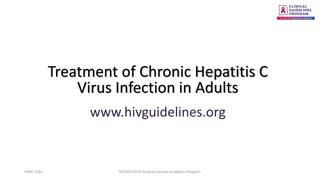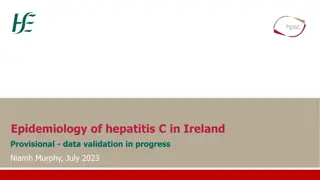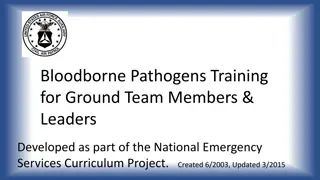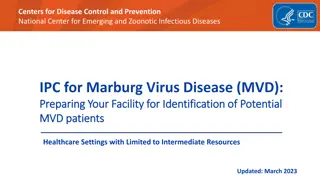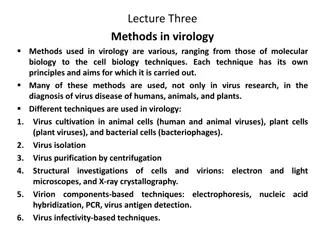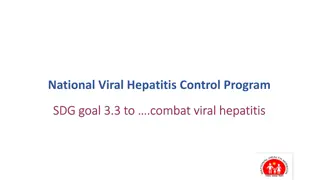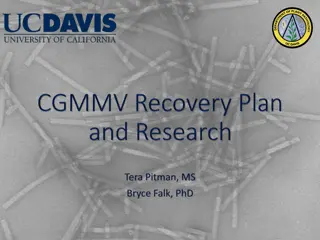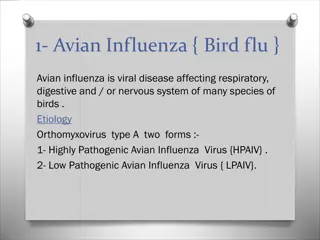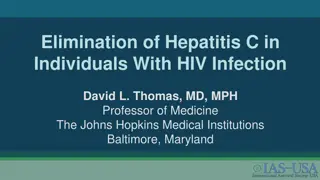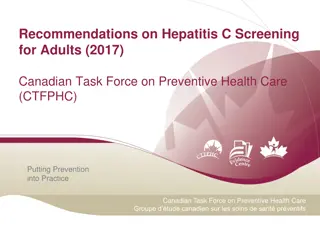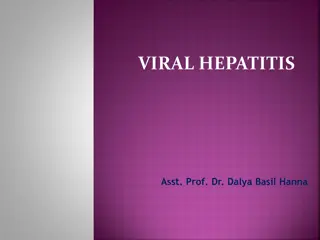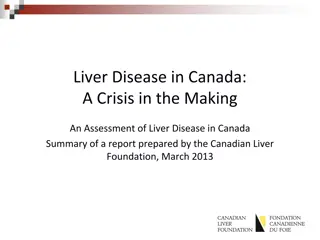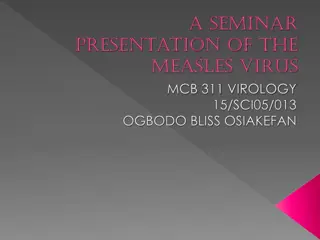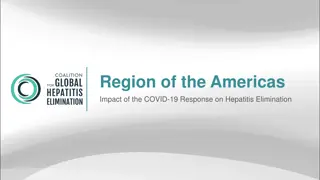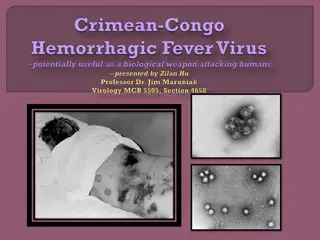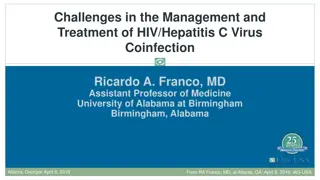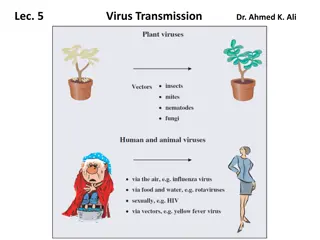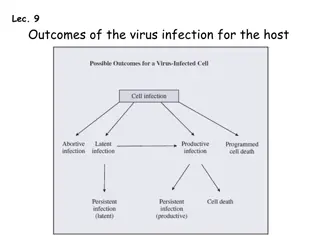Guidelines for Treating Chronic Hepatitis C Virus Infection
Clinical guidelines provide evidence-based recommendations for treating and curing chronic HCV infection in adults to improve treatment rates, reduce morbidity and mortality, and support the New York State Hepatitis C Elimination Plan. Recommendations include considerations in HCV treatment initiati
2 views • 28 slides
Epidemiology of hepatitis C in Ireland
Hepatitis C, a viral infection affecting the liver, has notable implications in Ireland, with key transmission routes, clinical manifestations, and long-term consequences shaping its epidemiology. From transmission patterns to chronic infection risks, understanding the natural history and prevalence
0 views • 24 slides
Create a Virus Using Notepad: Dangerous Notepad Virus Codes
Learn how to create a virus using Notepad by following various dangerous virus codes such as creating fake Windows errors, stopping someone's internet access, and crashing a PC forever. Be cautious with these codes as they can cause serious harm to a computer system.
0 views • 10 slides
Ethiopia's Initial Experience on Hepatitis B Birth Dose Pilot Implementation
Ethiopia's initial experience on Hepatitis B birth dose (HepB-BD) pilot implementation includes background statistics, HBsAg prevalence, hepatitis B vaccination coverage, distribution of HBV infection, existing guidelines/strategies, and activities prior to the start of HepB-BD piloting.
0 views • 17 slides
Bloodborne Pathogens Training Overview for Ground Team Members
Understanding bloodborne pathogens is crucial for ground team members to protect themselves and others. This training covers what bloodborne pathogens are, focusing on Hepatitis B Virus (HBV) and Human Immunodeficiency Virus (HIV), their symptoms, transmission risks, and prevention methods. HBV fact
0 views • 29 slides
Importance of Screening and Separation in Marburg Virus Disease Control
Early identification and separation of suspected Marburg virus disease patients play a crucial role in preventing the spread of the disease within healthcare settings. Screening and setting up specific areas for identification and isolation are essential steps to protect healthcare workers, patients
1 views • 15 slides
Clinical Excellence in Hepatitis C Nursing: SCENS Program Overview
Demonstrating competency in infection control, abdominal assessment, specimen collection, and communication is crucial in nursing care for patients with Hepatitis C. The SCENS program focuses on key learning objectives to enhance clinical proficiency, address potential issues, and understand the com
0 views • 12 slides
Mẹ bị sốt virus ảnh hưởng gì cho thai nhi không
M\u1eb9 b\u1ea7u b\u1ecb s\u1ed1t virus c\u00f3 \u1ea3nh h\u01b0\u1edfng \u0111\u1ebfn thai nhi kh\u00f4ng? Mang thai l\u00e0 giai \u0111o\u1ea1n nh\u1ea1y c\u1ea3m v\u00e0 m\u1eb9 d\u1ec5 b\u1ecb nhi\u1ec5m virus, vi khu\u1ea9n g\u00e2y s\u1ed1t.
0 views • 3 slides
OSHA Bloodborne Pathogens Training and Hepatitis B Virus
Covering the basics of OSHA Bloodborne Pathogens Standard, this training material provides essential information on bloodborne pathogens, including Hepatitis B Virus (HBV). It emphasizes the importance of training for individuals with occupational exposure, outlining crucial topics such as Hepatitis
3 views • 56 slides
Overview of Virology Methods: Cultivation, Isolation, Purification
Various methods are employed in virology, including virus cultivation in different cells, virus isolation, and virus purification through centrifugation. Structural investigations, virion component-based techniques, and virus infectivity-based techniques are also common in virology research. Underst
1 views • 15 slides
Canine Infectious Hepatitis (ICH) - Overview, Symptoms, and Treatment
Canine Infectious Hepatitis (ICH), also known as Rubarth's Disease, is caused by Canine Adenovirus-1 (CAdV-1), affecting dogs of all ages. The virus primarily targets hepatocytes, leading to acute hepatitis, as well as respiratory and ocular issues. Transmission occurs through contact with infected
6 views • 7 slides
Hepatitis B BD Introduction Plan in Ghana
In Ghana, the introduction plan for Hepatitis B BD involves evaluating disease burden, estimating seroprevalence among pregnant women, obtaining necessary approvals, presenting evidence to NITAG, and seeking support for introduction. A policy for screening and prevention is in place, aiming to addre
1 views • 10 slides
Introduction of Hepatitis B Birth Dose in Mozambique: A Step Towards Comprehensive Prevention
Mozambique is gearing up to introduce the Hepatitis B birth dose as a strategic approach in its immunization program, aiming to tackle the high prevalence of HBV within the population, particularly among women and HIV-positive individuals. The country's existing policies on screening pregnant women
0 views • 15 slides
National Viral Hepatitis Control Program - Achieving Universal Health Coverage and Elimination Goals
The National Viral Hepatitis Control Program in India is working towards combating viral hepatitis and achieving SDG goal 3.3 through a comprehensive approach that includes awareness generation, prevention, management, and financing under the NHM. The aim is to eliminate hepatitis C by 2030, reduce
0 views • 19 slides
Advances in Hepatitis C Treatment for HIV-Infected Patients: A Comprehensive Overview
Explore the latest advancements in the treatment of Hepatitis C virus (HCV) in HIV-infected individuals through a detailed presentation by Dr. Kara W. Chew. Learn about the initial evaluation for HCV, treatment options for different genotypes, management of advanced fibrosis, recommended approaches
0 views • 9 slides
Cucumber Green Mottle Mosaic Virus: Disease Cycle and Testing Methods
This content provides detailed information on Cucumber Green Mottle Mosaic Virus, including its nucleotide genome, disease cycle, testing methods like DAS-ELISA and RT-PCR, seed testing protocols, bioassay for virus confirmation, and symptom expression in host plants. The data covers aspects such as
0 views • 14 slides
Avian Influenza: Symptoms, Diagnosis, and Prevention
Avian influenza, or bird flu, is a viral disease affecting birds' respiratory, digestive, and nervous systems. It presents in two forms - Highly Pathogenic Avian Influenza Virus (HPAIV) and Low Pathogenic Avian Influenza Virus (LPAIV). The virus has two important surface antigens, Hemagglutinin (H)
0 views • 7 slides
Elimination of Hepatitis C in Individuals With HIV Infection
Discussing the goals, treatment options, and global impact of Hepatitis C in individuals with HIV infection, this presentation by Dr. David L. Thomas from Johns Hopkins Medical Institutions sheds light on important aspects such as mortality projections, WHO elimination goals, and targets for hepatit
0 views • 40 slides
Decline of Hepatitis C in England: 2022 Report Highlights
The 2022 report on Hepatitis C in England shows a continued decline in the prevalence of chronic HCV infection, with around 81,000 individuals estimated to be affected in 2020. The report also highlights the distribution of infections among individuals with different drug injecting histories. Data f
0 views • 41 slides
Hepatitis C Screening Recommendations for Adults (2017)
The Canadian Task Force on Preventive Health Care (CTFPHC) released recommendations on Hepatitis C screening for adults in 2017. The guidelines provide an overview of screening methods, key findings, implementation considerations, and conclusions. Those at higher risk for HCV in Canada include indiv
0 views • 38 slides
Zoonotic Hepatitis A Virus Infections
Zoonotic hepatitis A virus infections primarily affect humans and nonhuman primates, with transmission occurring through fecal-oral route. This article delves into the reservoir, mode of transmission, clinical signs, and diagnosis of hepatitis A, shedding light on its impact on both species. Nonhuma
0 views • 22 slides
Epidemiology of Hepatitis B and C in Florida: 2019 Data Analysis
The Department of Health in Florida has released the 2019 data on the epidemiology of Hepatitis B and C as of January 21, 2021. The report includes information on acute and chronic cases, technical notes on case definitions, and changes in national case definitions in 2020. Acute cases require speci
2 views • 35 slides
Viral Hepatitis: Causes, Types, and Clinical Symptoms
Viral hepatitis is caused by various hepatotropic viruses, including Hepatitis A, B, C, D, and E. This type of liver inflammation can manifest acutely or chronically, leading to symptoms such as jaundice, abdominal pain, nausea, and fatigue. Hepatitis A virus, in particular, is primarily transmitted
0 views • 36 slides
Overview of Hepatitis B Infection in Ireland: Epidemiology, Transmission, and Prevention
Hepatitis B infection is a viral liver disease transmitted through various means such as contact with infected body fluids. The virus can lead to acute or chronic infection, potentially causing severe liver complications. Vaccination programs and lifelong treatment options aim to manage and prevent
0 views • 30 slides
Overview of Bovine Viral Diarrhea Virus (BVDV)
Bovine Viral Diarrhea Virus (BVDV) is an RNA virus belonging to the Pestivirus genus in the Flaviviridae family. It is classified into BVDV-1 and BVDV-2 genotypes with distinct biotypes. BVDV is a significant infectious disease in the livestock industry worldwide, with high prevalence and clinical c
0 views • 14 slides
Overview of Hepatitis C Epidemiology in Ghana by Dr. Fred Stephen Sarfo
Dr. Fred Stephen Sarfo's research on Hepatitis C in Ghana reveals a notable sero-prevalence of the virus across various populations such as blood donors, prisons inmates, and more. The studies show varying HCV antibody frequencies, highlighting the need for continued surveillance and targeted interv
0 views • 25 slides
Liver Disease in Canada: An Assessment of the Current Situation
Liver disease in Canada, particularly hepatitis B, is a concerning issue highlighted in the report prepared by the Canadian Liver Foundation in March 2013. The incidence of acute hepatitis B is declining, especially among vaccinated age groups. The prevalence of chronic hepatitis B in Canadian immig
0 views • 58 slides
Hepatitis E Surveillance and Notifications in Ireland
The surveillance and notification of Hepatitis E cases in Ireland have been detailed, including the introduction of universal blood donor screening, notifiable disease status, and enhanced surveillance measures. The data shows trends in notifications, blood donor screening results, clinical cases, a
0 views • 13 slides
Measles Virus: A Comprehensive Seminar Presentation
The measles virus, also known as rubeola or morbilli virus, is a highly contagious infection that primarily affects the respiratory system. This presentation delves into the classification, characteristics, and pathogenesis of the virus, shedding light on its structure, transmission, and impact on p
0 views • 24 slides
Anti-Anti-Virus Techniques and Retroviruses
Explore the world of anti-anti-virus techniques including Retroviruses and Entry Point Obfuscation. Learn about the methods used by viruses to evade detection and damage anti-virus software. Discover how Retroviruses like Ganda virus operate stealthily to hinder anti-virus programs. Delve into strat
0 views • 24 slides
Impact of COVID-19 Response on Hepatitis Elimination in the Americas
The data presented focuses on the impact of the COVID-19 response on hepatitis elimination efforts in the Americas region. It includes information on changes in in-person clinic visits, declines in hepatitis B and C screening and treatment, and disruptions in opioid substitution therapy. The graphs
0 views • 13 slides
Overview of Crimean-Congo Hemorrhagic Fever Virus
Crimean-Congo Hemorrhagic Fever (CCHF) virus is an RNA virus belonging to the genus Nairovirus, causing a zoonotic disease with high mortality rates in humans. The virus is transmitted mainly by ticks, particularly the Hyalomma species, and can result in severe illness in both domestic and wild anim
0 views • 17 slides
Advancing Hepatitis C Treatment Financing Model in Cameroon
Exploring a successful financing model to eradicate Hepatitis C in Cameroon through innovative treatments and funding strategies. The initiative aims to identify and treat Hepatitis C carriers in partnership with the Ministry of Health, focusing on expanding treatment access and incorporating a pay-
0 views • 5 slides
Challenges in the Management and Treatment of HIV/Hepatitis C Virus Coinfection
This presentation by Dr. Ricardo A. Franco focuses on the challenges faced in managing and treating patients with HIV/Hepatitis C virus coinfection. It discusses the burden of HCV mono-infection and HIV/HCV co-infection, the impact of HIV co-infection on survival in HCV-related cirrhosis, and the ro
6 views • 26 slides
Chicken Pox: A Seminar on the Medical Importance of Viruses
Chicken pox, caused by the Varicella-zoster virus, is a contagious infection primarily affecting children. This seminar presentation delves into the classification, route of infection, symptoms, and treatment of this viral disease common in Africa. The Varicella-zoster virus, a member of the herpes
0 views • 17 slides
Virus Transmission via Vectors in Hosts
Viruses must be propagated and transmitted to new hosts for survival. They can be spread via vectors like arthropods, which acquire and transmit viruses during feeding. This transmission can occur quickly through the vector's mouthparts or more slowly via circulation in the vector's body. Plant viru
0 views • 14 slides
Cauliflower Mosaic Virus: Structure, Reproduction, and Genome
Cauliflower Mosaic Virus (CaMV) is a plant virus studied by Assistant Professor Kavita Basumatary at Goalpara College. The virus has a circular, double-stranded DNA genome of about 8000 bp in length with unique discontinuities. Reproduction involves the viral genome entering the host cell nucleus, w
0 views • 6 slides
Outcomes of the virus infection for the host
The outcomes of virus infection in hosts can range from productive infections, latent infections, to abortive infections. Some viruses persist in hosts for long periods, potentially leading to cancer. The relationship between viruses and hosts involves an arms race, with viruses developing counterme
0 views • 10 slides
Nipah Virus: A Comprehensive Overview
Nipah virus, belonging to the Paramyxoviridae family, is a zoonotic virus with high pathogenicity and mortality rates. It falls under the Henipavirus genus, known for infecting a wide range of animal species. Its virion structure consists of non-segmented, negative-sense RNA, and the viral genome co
0 views • 22 slides
VIRAL HEPATITIS
Hepatitis is inflammation of the liver caused by viral infections, toxins, or autoimmune responses. Learn about the types, causes, modes of transmission, clinical manifestations, diagnostic evaluations, management, and prevention of viral hepatitis. Get insights from nursing tutor Mr. Dinesh Singh a
0 views • 14 slides
